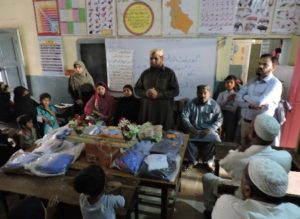Schools in Pakistan’s Sindh Province—where low literacy rates, teacher unavailability, and gender-based social norms hold students, especially girls, back—have struggled to provide basic education to the area’s population for years.
Blumont’s Sindh Community Mobilization Program (CMP) has worked with area schools since 2013 to engage the community in improving education and to build the capacities of school organizations. Hoping to spark change, CMP organized broad-based meetings with community members, who took the reins in transforming the long-neglected schools.
In Saidi Lower, a remote village in Sindh’s Khairpur District, Ms. Shahzadi Fatima made a huge positive impact on the village’s small school. Shahzadi, a teacher from Syed tribe, and her husband actively involved the communities of Saidi Lower and its neighboring hamlets, and proposed to restructure the school management committee (SMC). They also utilized available funds to improve the school’s basic facilities.
Being a community activist and a female teacher, Shehzadi gained parents’ trust. Parents started allowing their daughters to attend school after she conducted door-to-door meetings urging their attendance.
Soon, the excessive flow of students created a shortage of teachers. To solve the issue, Shehzadi decided to pay the wages of an additional teacher from her own pocket so the school could continue to provide quality education. Simultaneously, CMP restructured the SMC and provided trainings on financial management and small grants. Following the training, CMP provided a $1,423 grant for water, sanitation and toilet facilities for the school. Community members also contributed by providing water coolers, labor for repairing the school’s boundary wall and installing hand pumps.
Shahzadi said she is proud of her and her husband’s work.
“It is not very common for a married woman from Syed tribe to step out and strive for the betterment of education, but this all could become possible with the support of my husband and his understanding towards community development,” Shahzadi said. “I also feel fortunate to have a cooperative community which gives high priority to girls’ education.”
Nusrat Colony’s school in Sukkur District faced the same issues as the school in Saidi Lower. Hoping to mobilize the community in the same manner, CMP worked with Nusrat Colony’s community members, SMC and teachers to improve the school’s facilities and organization.
One outstanding teacher who helped transform Nusrat Colony’s school was Mr. Javed. During every academic year, he purchased fabric and his daughter stitched uniforms for all the students.

Mr. Javed and other teachers during uniform distribution at the Nusrat Colony school
“We donate uniforms, books, stationary and other essential material so [student of lower-income parents] don’t feel deprived,” Mr. Javed said. “I believe this is our moral responsibility, to demonstrate kindness as teachers.”
Mr. Javed and three other teachers also helped pay the salaries of two private instructors, who would help retain female students.
Through the work of both Shehzadi and Mr. Javed, these two schools have been able to provide quality, transformative education, and demonstrate community-driven, sustainable development.
RELATED READING:
Sindh Community Mobilization Program (CMP)
School Groundbreaking Ceremony in Pakistan a Great Success
Innovative Partnership to Improve Sindh Schools



